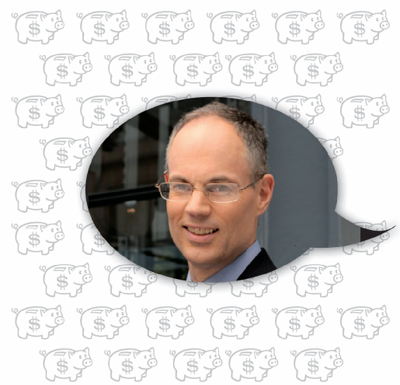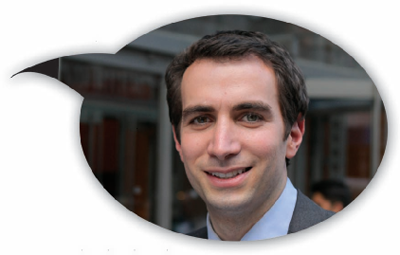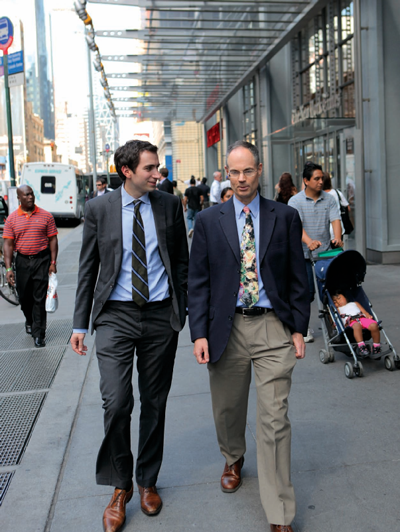Photographs by John Abbott

They’re two of the most prominent voices in American financial journalism. Former Daily Sun editor-in-chief Peter Coy ’79 is economics editor of Bloomberg Businessweek, where he has worked for more than two decades. Andrew Ross Sorkin ’99, New York Times business columnist and co-anchor of CNBC’s “Squawk Box,” wrote the 2009 bestseller Too Big to Fail, an exhaustive analysis of the 2008 financial crisis that was made into an HBO film, which he co-produced; he also edits the Times-affiliated news site DealBook.
In early August, Coy and Sorkin sat down with CAM over lunch in the Times building to discuss their careers and the current state of financial journalism. By lunchtime, Coy had already made a lengthy appearance on C-SPAN to discuss that week’s cover story (“Why the Debt Crisis Is Even Worse Than You Think”) and Sorkin had broken the news—on television and online—of Kraft’s decision to split its grocery and snack businesses.
Cornell Alumni Magazine: How do you explain complex financial concepts to the average reader?
Andrew Ross Sorkin: As simply as possible. Oddly enough, I was probably better at this when I didn’t know a lot, because then you’re forced to make people explain to you in the most basic terms to the point where you understand every element of it. But when you start thinking you actually understand, it can be dangerous.
Peter Coy: It’s true. I find that I don’t really understand something until I’ve written about it, because the exercise of writing forces you to boil and boil until you have it straight in your mind. That, to me, is the most enjoyable part of the job— figuring out hard-to-figure-out things and explaining them to people. The other thing is you have access to really smart people; Andrew and I both work for publications where people will call us back. I get Nobel Prize-winners on the phone giving me tutorials—stuff that I should have learned in college, but didn’t.

CAM: How is financial reporting different from any other beat? Or is it similar to, say, sports?
ARS: There’s a certain kind of reporting that is sort of like sports. You go to the game, you tell the world what happened; you report on a fire or what the president said today. But business reporting infrequently happens in front of you. It’s rare where you get a ringside seat to the board meeting and report on what happened. I think the challenge is to take the reader inside the room—so you can tell the story so that it almost feels like you’re watching the sporting event. But it’s hard to do that in real life.
PC: Andrew is one of the best at what he just described. You should ask him to tell you the story about how he doped out some of the sequences in Too Big to Fail, the painstaking work of reconstructing those scenes.
ARS: In Too Big to Fail I tried to recreate what happened in every meeting. I would sit with people for hours and ask, “What did you say? And what did he say? And what did she say back to you?” And I’d do this until I’d talked to virtually every person in the room. Then I’d sit in my living room with notes and match the quotes; for the ones that didn’t match, I’d call everyone back and say, “There’s another person who said you said it like this. And another person who said…” Until I got people to say, “Well you know what, that’s actually right.”
PC: Tell the story about the person who didn’t want to talk to you until…
ARS: A lot of people do return your calls, but often people don’t want to talk to you either because the information’s too sensitive or they’re not interested. In the example Peter is talking about, there was an executive who didn’t want to talk to me. Finally I get him on the phone on a Sunday afternoon and say, “Look, I understand you don’t want to talk to me, I’ve talked to your friends, your lawyer says leave you alone, I get it.” And then I laid out for him what reporting I’d done. I said, “OK, I have you in [Morgan Stanley chairman and CEO] John Mack’s house on Saturday morning at 10:30. You’re sitting in the living room on the green couch, eating a chicken wrap sandwich his wife brought you. Your son’s lacrosse game started at 1:30, you didn’t show up until 2:30, and this is what you said.” And there’s this very long pause. By the end of the call he said, “I think we should talk.” And that’s how this happens over and over. The deeper you get in the reporting, the more other people become attracted to talk to you.
PC: Again, Andrew is one of the very best.
ARS: But you do a much more granular analysis.
PC: Well, the difference is that he’s mostly covering Wall Street and finance and I mostly cover economics, although we do overlap here and there. Mine is less about recreating a scene than combing through data, looking for patterns, for trouble spots. I love finding a new data source. Then I’ll say, “I still don’t understand this,” so I’ll get some geek on the phone to explain it to me, and some other geek to explain that person’s explanation, until I feel comfortable enough I can quote it in an article.
ARS: Peter, I would say you’re selling yourself short on one aspect of this, which is the reason why your stuff is as good as it is. Not only do you talk to all the geeks and figure it out, you then use the human drama. If you’re writing a mortgage story you might find a banker or someone who just lost their house, and tell the story so it’s more accessible. You may start with the numbers, but then you find people.

CAM: How do you maintain relationships with sources that are cordial without being in their pockets? In other words, how do you maintain objectivity while getting people to return your phone calls?
PC: I am impressed with Andrew’s ability to do that. He lays into some of these guys he knows he’s going to need in the future. So I want to hear his answer.
ARS: My sense has always been that if you approach people openly—explain what you’re doing, give them the opportunity to respond, and come at them with an open mind—that even if you come to the opposite conclusion than they do, they will respect you for it. I’ve had lots of instances where I’ve called people and said, “I’m about to write something very critical. You are probably going to be very unhappy—or worse. Let’s go through any and all reasons why I shouldn’t be writing this, or at least tell me your side of the story.” The other thing is being balanced overall; if somebody does something good, you acknowledge it, and when they do something bad, you call them out for it. But if you’re just giving atta-boys, or if you’re just hitting people over the head, nobody will respect that. Does that make sense?
PC: Yeah, I think that captures it. A lot of it comes down to basic journalism practices; you have to make sure your facts are right, and you’ve got to give people a chance to respond. And you have to pay attention to their responses, even if that means your story changes. I had that happen about a year ago, where I was going to blast this Washington nonprofit that’s involved in low-income housing. I thought I had the goods on them—somebody had tipped me off—and I was reporting around them before I went to them; they caught wind, and we talked. So I sat down with the guy, and I realized we needed to kill the story. It was a momentary embarrassment that I’d wasted a bunch of time, but I’m glad that story never appeared.


